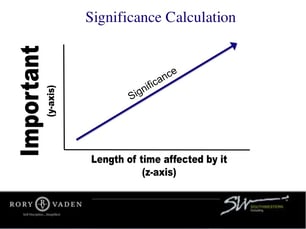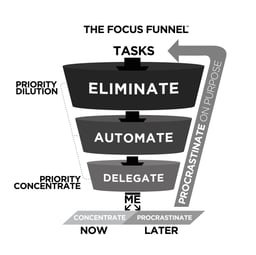 In 1989 Stephen Covey introduced the 7 Habits of Highly Effective People. In his book he referenced the 4 Quadrant Idea for managing time we shared in Focus on Priorities – Eisenhower Matrix.
In 1989 Stephen Covey introduced the 7 Habits of Highly Effective People. In his book he referenced the 4 Quadrant Idea for managing time we shared in Focus on Priorities – Eisenhower Matrix.
Rory Vaden author of Procrastinate on Purpose: 5 Permissions to Multiply Your Time, points out TV remotes weren’t even in common use then. 
Today’s environment is one of perpetual change.
You can’t use yesterday’s time management system to manage properly in today’s environment.
Instead of just Important (How Much?) and Urgent (How Soon?) there’s a third element added to Covey and Eisenhower’s Four Quadrants.
If you’re like me, you’re always attempting to improve the use of your time. It’s one reason the book, The One Thing: The Surprisingly Simple Truth Behind Extraordinary Results by Gary Keller with Jay Papasan.
Vaden’s presentation was so compelling, I purchased the book, and while I’ve only begun to explore it I believe it provides the type impactful ideas which may put it on a par with The One Thing.
SIGNIFICANT
Today we’re faced with what Vaden calls priority DI-LUTION. We’re investing more time simply putting out fires.
Significance is the third element to the Covey and Eisenhower’s equation today. It is: How long is this going to matter? And it completely changes everything.
From Procrastinate on Purpose: 5 Permissions to Multiply Your Time: Here’s why that’s powerful . . . Just like Urgency is a part of the Importance calculation, so is Significance. Which means that as you factor in a calculation for Significance, it begins to offset some of the weight and pull of Urgency—which is the exact cause of Priority Dilution! Remember, Priority Dilution is allowing ourselves to be pulled out of quadrant 2 (Important but Not Urgent) always and mostly into quadrant 1 (Important and Urgent). That causes us to neglect some of the critical activities that lead to long-term success; it causes our priorities to dilute.
 For example, let’s say that you have a vision and a passion for creating better customer service, and that is an area of your business that really matters to you. Now, let’s say that you have two choices on how to spend your time today:
For example, let’s say that you have a vision and a passion for creating better customer service, and that is an area of your business that really matters to you. Now, let’s say that you have two choices on how to spend your time today:
- Create the customer service–training program for your team.
- Spend time providing awesome service to your customers personally.
If you only include the Urgency calculation, then it is obvious that you would choose option two and spend time providing awesome service personally. But if you include the Significance calculation, you realize that a great deal of consideration should be given to the idea that you create the training program.
If you manage your time and you serve customers who have urgent needs very efficiently, you could serve a lot of customers today . . . but there would be a limit.
If you prioritize your time and you serve your most important customers first then you would be effective . . . but it doesn’t guarantee you’ll provide exceptional service to everyone who needs it.
If you invest your time into creating the training program, however, then you make a more significant impact because exponentially more customers can receive great service through the influence you make on the other customer service agents.
Awesome service delivered by you to some customers is important and it matters today, but a program that ensures that all of your team provides awesome service to every customer is significant and it matters forever.
I’m not telling you that one decision is right and one is wrong. I’m not telling you that one decision is better and one decision is worse. In fact, each decision could be the “right” decision for different people in different circumstances. What I hope to convey, though, is that simply adding this one new element of consideration to your thinking instantly has an emotional effect on which option you choose.
Those making the Significance calculation are operating on a plane of different perspective. They are considering not only what matters now but also what matters later. Therefore that person is better able to resist the temptation of the tyranny of the urgent—which is exactly what ultra-performers do.
Vaden offered an example of significance: You have a broke teenager of wealthy parents. If you’re a wealth management person, managing his parent’s financial portfolio, when do you invest time with him. At some point in time, things will change. It will be significant. What will happen when his parent’s die?
EMOTIONAL EQUATION
Vaden shares: Choosing how to spend your time isn’t just logical; it’s emotional. Human beings are not logical creatures. We are emotional. As human beings, we are driven by feeling and we are moved by impulses. We have a desire to please. We have a yearning to impress. We have a need to be accepted. We are tempted by pleasure. We get tired from work. We get stressed from pressure. And we are called to experience community and connectedness. Oh yes. We are definitely emotional.
Ask yourself how many times have you fallen to the emotional impulses of pleasure, stress or tiredness?
MULTIPLY YOUR TIME
You need to be able to multiply your time by giving yourself the emotional permission to spend time on things today that will give you more time tomorrow. Please read Strategic Discipline Harnesses Powerful Forces. It shares Albert Einstein belief that compound interest is the most powerful force in the universe. [Compounding is reinvesting the income on an investment and watching your principle grow. It grows exponentially over time.
Vaden shares that automation is to your time what compound interest is to your money.
To understand this Vaden stated you need to look at your money like a wealthy person does. When a wealthy person decides to spend $5 on a cup of coffee, he realizes it means he can’t invest $5 on something else. It’s like compound interest. 
The #1 question you should ask is: can this be eliminated? Or Can I live without it? Every time you say YES, you actually say NO to something else. He recommends you start realizing NO is a complete sentence. He called it the sculpture’s principle: Perfections is achieved – what are the things to take away?
It’s the first step shown here in the Focus Funnel. The sculpture creates a work of art by eliminate chips from the stone to reveal the inner beauty of the stone.
In the case of the wealthy person, Question #2: Is this $5 offer worth $50 30 years from now? That’s how a wealthy person thinks. They recognize the value of their money not only today, but what it will yield in the future if they invest it instead of spending it today.
NEXT BLOG
In Positioning Systems’ Strategic Discipline coaching we emphasize the two critical characteristics for effective leaders, the ability to forecast and delegate. Vaden offered powerful evidence for the value of Delegation with a 30X Rule. Next blog we’ll share when trying to decide whether to delegate something to someone else or to do something yourself, how and why you should use the thirty-to-one rule.






.jpeg?width=150&height=135&name=Hand%20with%20marker%20writing%20the%20question%20Whats%20Next_%20(1).jpeg)

